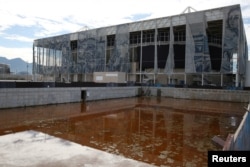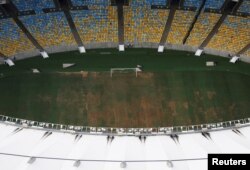Less than six month after Rio de Janeiro hosted the first-ever Olympics in South America, game venues sit idle and already in disrepair, raising questions about a legacy that organizers promised would benefit the Brazilian city and its residents.
"We thought this would be for us," said Alex da Silva Ferreira, a mechanic who walked with his 7-year-old son past the locked gate of what was supposed to be a park in Deodoro, a neighborhood that hosted canoeing and mountain bike competitions. "It's been closed this entire time."
A lack of activity and upkeep is plaguing facilities including the site of swimming competitions, where craters from disassembled pools collect stagnant water, and Rio's famed Maracana stadium, site of the opening and closing ceremonies.
The field there, one of the most iconic soccer pitches in the world, is giving way to dirt and scrub. Electricity was cut recently because of a financial spat between local officials and the contractor hired to manage the stadium.
Before the games, organizers touted the venues as facilities that could easily be repurposed in sports-crazed Rio. But little more than one beach volleyball tournament has been played at any of the venues - and even that drew criticism because it involved throwing sand on the Olympic tennis court.
"I guess sand is better than nothing but it's pathetic not to be playing tennis there," said Fernando Meligeni, who finished fourth in the tennis at the 1996 Games.
Federal, state and local governments, along with private partners, paid more than 40 billion reais ($12.8 billion) to host the Olympics, about 7 billion of which was for game venues and related facilities. Now they are negotiating with each other and new partners to find ways to fulfill the expected Olympic legacy.
They acknowledge the delays and blame a series of factors for the failure to repurpose the venues - from Brazil's continuing recession to disagreements with contractors and a change in mayors after elections in October.
"It's a complicated moment," said Patricia Amorim, the subsecretary for sport of Rio's city government, during a recent visit to the massive grounds where events like tennis, swimming and basketball were held. "There's no doubt discomfort that this pretty park, so full not long ago, is not being used in the way that we, residents and athletes, would like."







